Trigger Warning and Disclaimer: the content that you are about to read contains graphic and sensitive experiences. The opinions and opinions expressed in this piece solely reflect the author's views and not Andariya's. Reader discretion is advised. Read our full editorial notice here.
On April 15, 2023, the lives of millions of Sudanese were turned upside down. It was the beginning of a war that reshaped the face of the nation, claimed innocent lives, forced entire generations into displacement and exile, and compelled young people to confront destinies they never chose.
According to a report by the UN High Commissioner for Refugees (UNHCR), issued on May 3, 2025, the number of people affected by the conflict exceeded 12.7 million. Among them were nearly 8.8 million internally displaced persons, and more than 2.7 million refugees who fled to neighboring countries and beyond.
As harsh as these figures are, they do not tell the whole story; behind every number lies a human tale marked by fear, loss, and the struggle to survive.
On the sidewalks of 'Almarai', sans-serif !important, and in crowded homes in Kampala, Chad, and Libya, painful stories emerge of young people who suddenly found themselves caught between the hammer of war and exile. Some had been dreaming of educational or professional projects, while others were on the verge of graduation or beginning their careers, before the barrels of guns killed their dreams and turned their lives into a living nightmare.
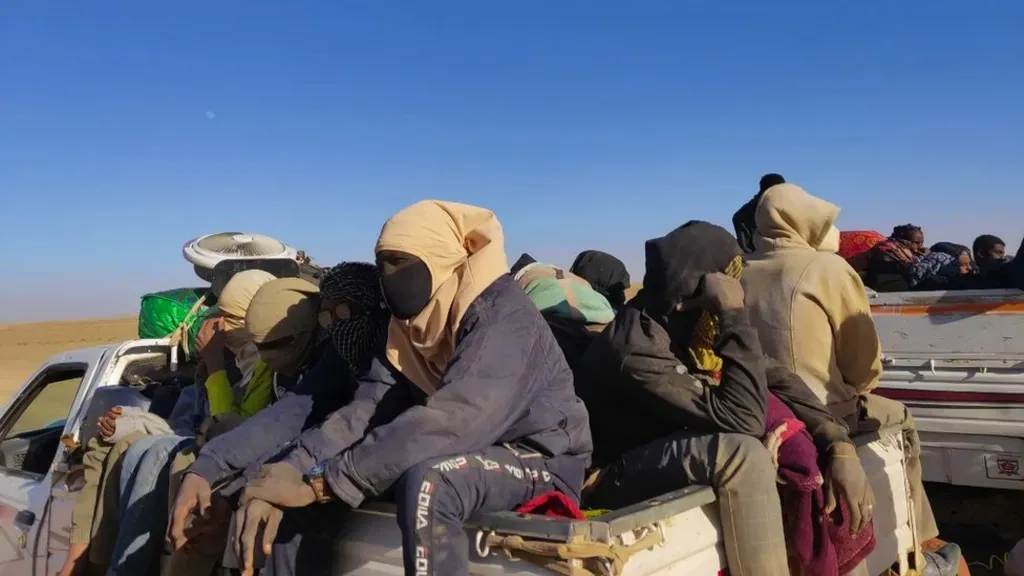
Thousands of Sudanese have been subjected to various forms of abuse by human trafficking gangs. Source: BBC News
From Khartoum to East Africa and then Libya: the Story of a Student from North Darfur
The young man recalls the very first moment before beginning his story: “We woke up to the sound of gunfire at the Central Dormitory of the University of Khartoum,” begins the Sudanese student (who preferred not to disclose his name). He fled into nearly empty streets, moving between buses and walking until he reached Omdurman.
After a month and a half, he decided to head toward Darfur: “I decided to leave Omdurman because I was convinced this war would not end in days or weeks, and that the chances of survival were diminishing every day.”
He describes part of his journey to Darfur: “I rode on the back of a Zs truck along with around 250 others fleeing Omdurman. We headed toward Darfur in a journey that lasted seven days, during which I witnessed every kind of suffering at the checkpoints, from questioning and interrogations to beatings at times.”
He settled temporarily in El-Fasher, but as the future grew even narrower, he chose to migrate through South Sudan.
He continued “I spent four months there amid hunger and malaria, which struck me more than five times, causing me to lose 13 kilograms,” he recalls. “I decided to return to Sudan and from there head to Libya through smuggling. I came back through El Daein then to El-Fasher, then Mellit, and from there on smuggling vehicles to the Libyan city of Al-Kufra."
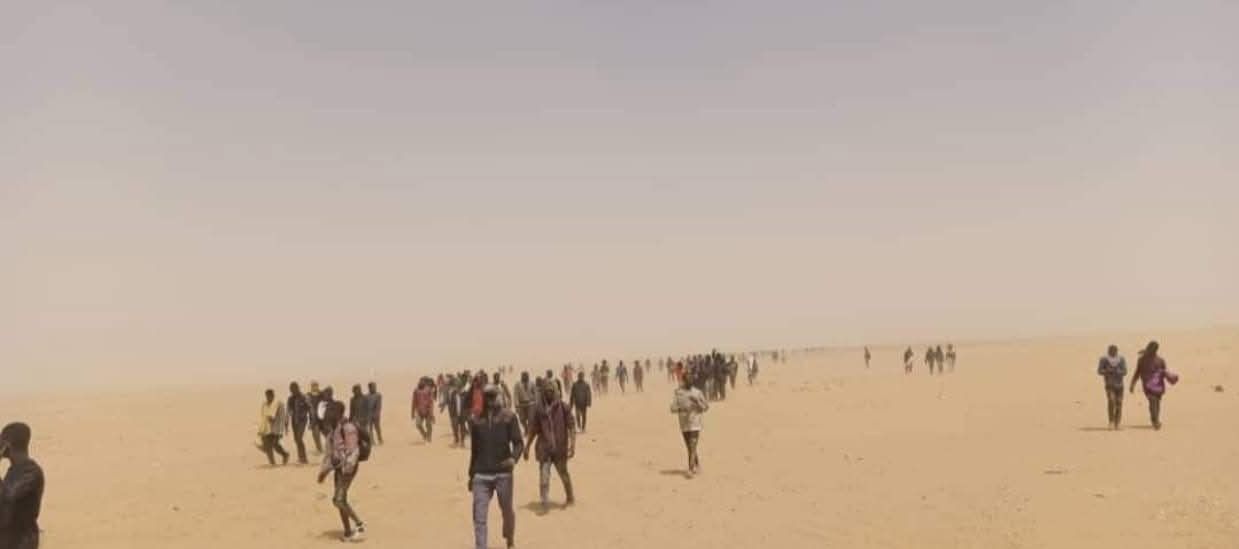
Sudanese youth migrating to Libya. Source: Facebook
He recounts the harrowing journey between risk and hope:
“It’s beyond description… we were like cattle tied with ropes on the back of a truck, covered with plastic sheeting. From Kufra, I continued to Benghazi, where I finally settled and began looking for work. I worked in many places, food trade, companies, laundries, and other places. Many times, we were cheated, working for months without pay; the employer would often escape responsibility or refuse to pay, hammering insults. On top of that, we constantly faced raids by anti-immigration forces, forcing us to live in hiding in houses, as if imprisoned for days.”
With a tone that blends pain and determination, he continues: “My life in Libya is not what I want, it is full of hardships, tragedies, and uncertainty. But at least, thank God, I consider myself lucky to still be alive, and I don’t expect a shell to fall on my head as it was in Omdurman. I work hard to cover my living expenses and dream of a country with stability and a better life.”
Today, he lives in Benghazi, working in various jobs, but he describes his life there as “a survival from death, nothing more,” amid racism and harsh treatment of migrants.
Thirteen Nights on Foot: the Journey of Talal Ibrahim
Talal, a young Sudanese man, stayed in Khartoum for three months after most of its residents had fled. He moved to El-Gezira State, but the war reached him there too. He then left to Sennar and from there walked for thirteen days towards eastern Sudan.
Talal recounts another part of the story, filled with harrowing scenes: “Death was closer to me than life. I saw corpses in the streets, and dogs feeding on the dead.”
He eventually reached Egypt, burdened with memories soaked in blood, unemployed, and living a life he describes as dark. His desire to return to Sudan collided with the haunting memories of war. He believes that political stability in Sudan is “just a temporary respite before another war.”
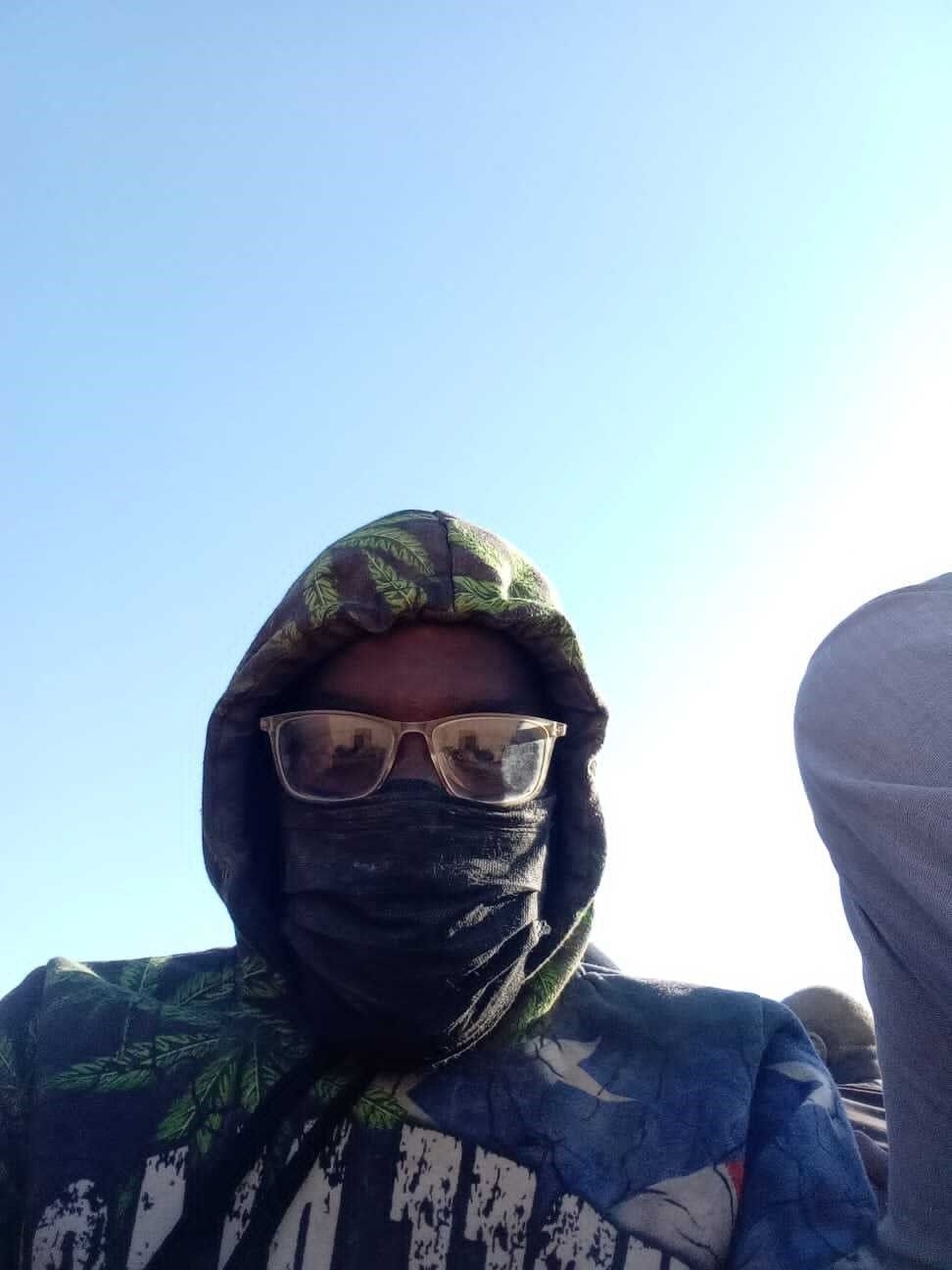
Talal Ibrahim on his way to migrate from Sudan to Egypt: Source: Talal Ibrahim
Shaimaa: When Guns Assassinate Birds' Dreams
Shaimaa Abu Alama never expected that her short trip to Saudi Arabia, which she began at the end of 2022 to catch her breath and reorganize her life, would turn into a turning point that completely changed her path. At the time, she was a trainer seeking a shift in her career, aspiring to move into a field closer to her passion. She had carefully planned to return to Sudan after three months to start a Master’s degree in media at the International University of Africa, alongside launching her own business with her friend.
Shaimaa says: “After performing Umrah, I was living the most beautiful moments of positive solitude, enjoying the calm and planning precisely what I wanted my future life to be like. I was about to reap the fruits of this retreat when suddenly the news hit like a thunderbolt: war had broken out in Sudan.”
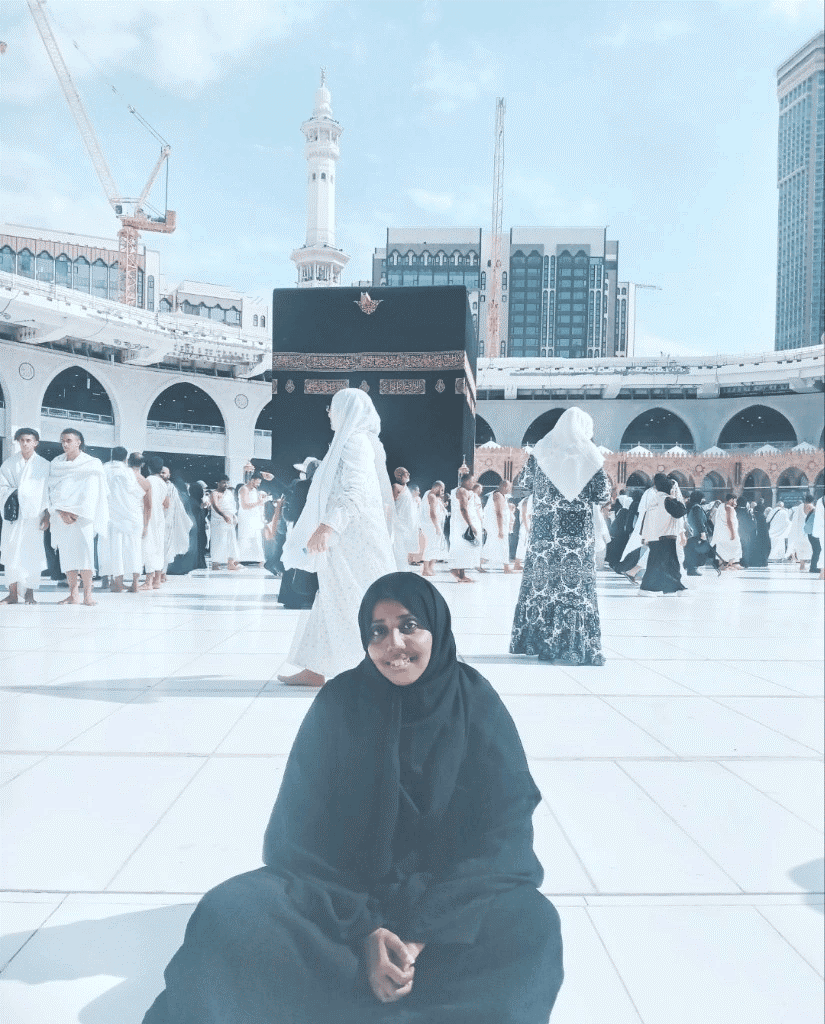
Shaimaa performing Umrah in Saudi Arabia. Source: Shaimaa Abu Alama
Although she wasn't physically present in Sudan when the fighting erupted, its psychological and practical impact struck her life deeply. Overnight, her emerging business collapsed, her academic plans evaporated, and her dreams were postponed indefinitely. The first months of the war were especially harsh, filled with anxiety for her family and friends, with complete inability to return or offer support.
But Shaimaa didn't give up. She found in her passion for voice-over work a window of hope, investing in developing this skill despite the circumstances. She enrolled in a six-month online training camp, during which she received precise evaluations from experts, most notably her Palestinian trainer Ahmed Abu Saada, whom she describes as the “vocal encyclopedia” and who had planted the seed for this path in her since 2021. It was not easy; she started in a new environment without an audience, with a foggy vision ahead. Pressures accumulated, work opportunities dried up, and she spent nine months in 2023 without any income from this field, which generated intense frustration and a sense of futility.
“These were dark moments,” Shaimaa says, “but having someone who believes in me made the difference.” One of her supporters was the Sudanese journalist living abroad, Munadil Abdullah, who encouraged her to continue and not give up. Indeed, she managed to rise again, recording her first paid work at the end of 2023. Since then, she has made great strides in her career, eventually becoming a voice consultant and voice development trainer in 2024.
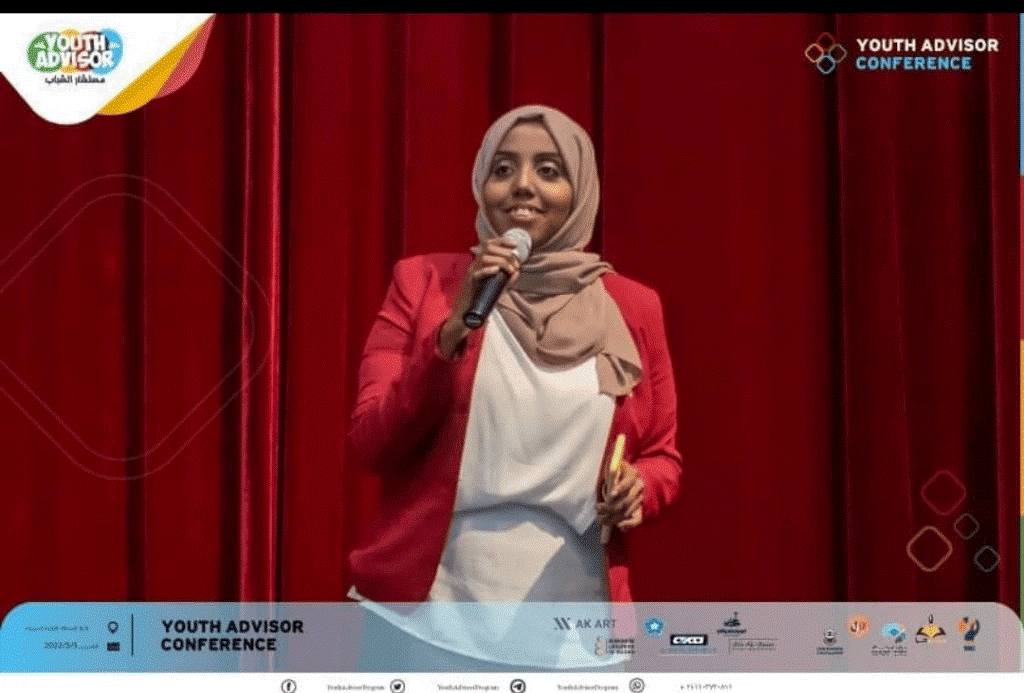
Shaima Abu Alama at the Youth Advisor Conference before the War: Source: Facebook
Although she now enjoys professional stability, the longing for Sudan remains. What she misses most is “peace of mind” and easy access to a supportive environment where she can develop her work. She says: “no matter the comfort that living abroad provides, it cannot give you the scent of Sudan.”
Shaimaa plans to return to her homeland one day, but not before she is ready to make a real contribution to the society she left behind, hoping that her postponed dreams will meet reality in a country healing from its wounds.
Thus, the testimonies continue, each complementing the other, forming a complete picture of Sudanese youth scattered in the shadow of war.
Ayman: the Bitter Life of Migration, Full of Suffering and Humiliation
For Ayman Hamad, a Sudanese man in his twenties, holder of a diploma in graphic design and vice president of Humans Hill for Human Rights, the morning of April 15, 2023, marked a radical turning point in his life.
Ayman says: “I was in public transport heading to Al-Arabi Market when I suddenly heard intense gunfire. The bus stopped, and the driver asked us to turn back, but we hadn’t gone far when a group from the Rapid Support Forces stopped us. They began searching the passengers, especially those with fair skin.”
The next moment was shocking. “I was with another young man. They confiscated my money and belongings, then shot the other man, killing him right in front of me. As for me, they beat me with the butt of their rifles until I lost consciousness.”
Ayman woke up in Al-Naw Hospital to find that his family had received news of his death. His voice over the phone was a joyous shock for them, but it did not erase the scene of death that continued to haunt him.
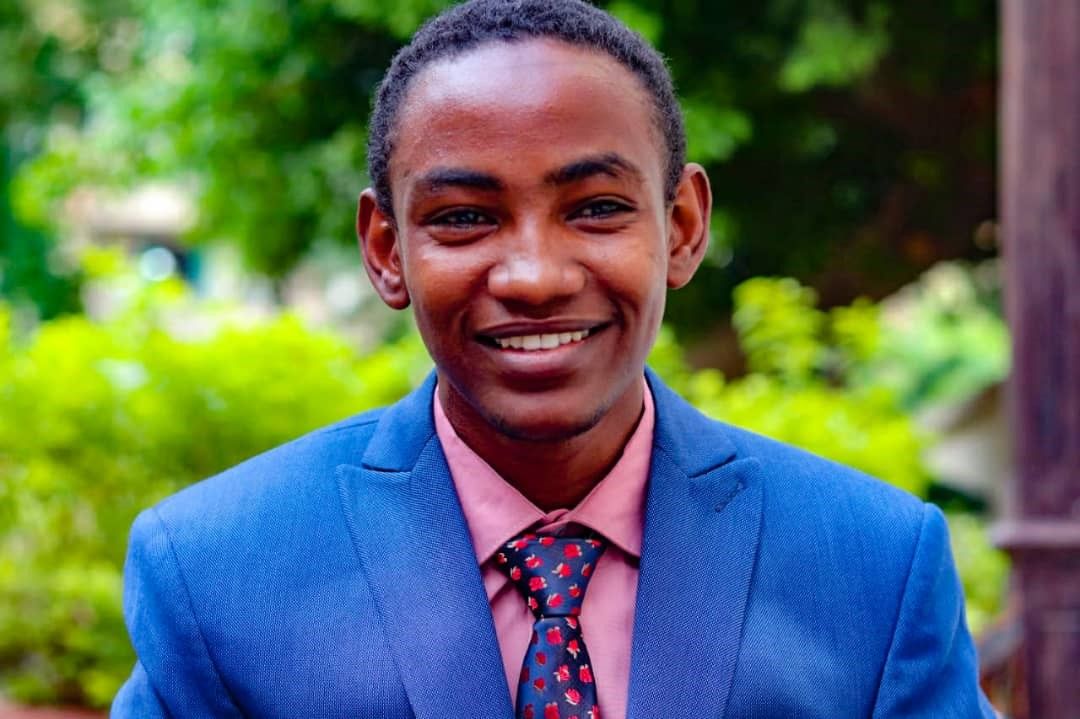
Ayman Hammad: Source: Ayman Hammad
After a short recovery period, he decided to leave Khartoum for Wad Madani. But the expansion of the war and the lack of safety pushed him to make a decision he had never considered: migration. He says: “I used to write articles against illegal migration, seeing it as a destructive path… but the war forced me onto that very same path.”
Egypt was his first stop, but 'Almarai', sans-serif !important did not provide the stability he sought; the high cost of living and lack of job opportunities pushed him toward Libya, and from there to Europe. Here, a new journey began, fraught with danger and humiliation, according to his account:
“From Sallum to Umm Saad, I walked 12 hours on foot. We hid from guards, then ran over the gravel to avoid capture. One migrant argued with the smuggler over money; the smuggler hit him, threw him to the ground, and placed his shoe on his head. In that moment, I felt that death was easier than this humiliation.”
However, reaching Libya was not the end of his suffering, a country torn by militias, where there is no protection or stability for migrants. Ayman worked in shops, companies, and laundries, often being denied his wages or subjected to humiliation. “We worked for months, and then the employer would refuse to pay, even insult you,” he says bitterly.
With the constant pursuit of illegal migration authorities, Ayman spent consecutive days confined at home, as if in an open prison. Despite all this, he continues trying to reach Europe, holding onto hope for change, though nostalgia for Sudan never leaves him. “I miss every detail… family gatherings, sessions with friends, even Nile Street. We leave the place, but the heart stays there.”
Conclusion
With this testimony, Ayman concludes a series of stories of a Sudanese generation torn apart by war and pushed by exile into paths they never imagined walking. His story, like those of his peers, reveals that survival in wartime may mean crossing from death to death, awaiting a postponed life whose arrival is uncertain.
The stories of the university student, Talal, Shaimaa, and Ayman are not exceptions but examples of thousands of Sudanese youth forced to completely redefine their lives. War changed not only their locations but also their relationship with themselves and their dreams. Inside Sudan, displaced people live in social isolation, lacking sufficient resources, trying to start from scratch. Abroad, refugees face challenges of residence, language, work, and racism. Many are trapped between the dream of returning and the fear of repeating the tragedy.
Yet, despite everything, some try to turn pain into motivation. Some launched small educational initiatives, others joined freelance projects, or learned new skills. Amid challenges and aspirations for the future, the spark of hope remains alive, even if fragile.
“We are not just victims of war,” says Alaa Ismail, a feminist activist and human rights defender temporarily residing in Kampala. “We are survivors trying to write our future with our limited tools.”
The April 15 war did not merely destroy buildings and infrastructure; it shattered the dreams of an entire generation. Yet, Sudanese youth continue searching for ways to survive and find meaning in their lives despite the bitterness of displacement and exile challenges. Returning home may be a postponed dream, but they know that reconstruction starts first from the broken interiors, from humans and the meanings of mercy and coexistence, before it begins with buildings.